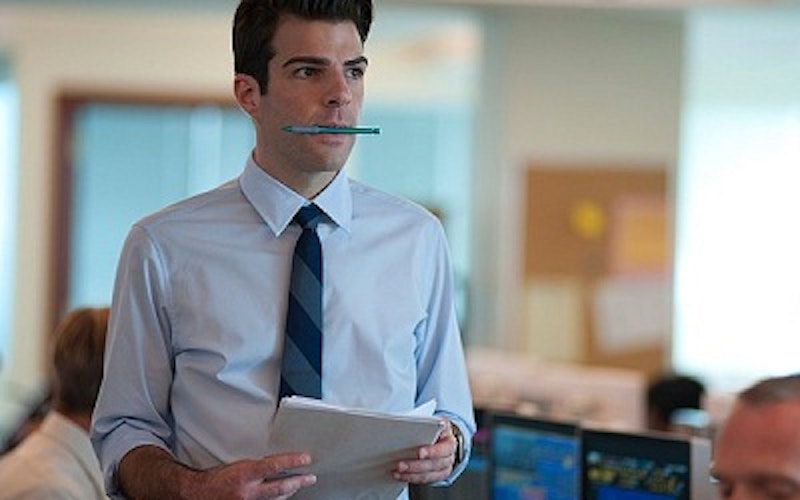
Music
‘Margin Call’ and the banality of evil
The new Wall Street drama “Margin Call” is only slightly less boring than a quarterly report. And that’s exactly what makes it so frightening.
Set at an imploding investment firm on the eve of the 2008 financial collapse, “Margin Call” means to capture the panic of that moment and raise our moral hackles over the dubious decisions surrounding it. The picture would be a rabble rouser, but it’s barely able to rouse itself. Instead, “Margin Call” mostly consists of men in suits discussing risk assessments, value assets and the like, none of which are explained or brought to cinematic life. Even after a low-level risk analyst (Zachary Quinto) stumbles across some alarming trends, the film mostly proceeds as a series of male executives (and Demi Moore) taking turns looking at computer screens with expressions of increased alarm.
It dawned on me after the movie was over, however, that although the dullness of “Margin Call” was an artistic failure, it may have been thematically appropriate. In its very triteness, the film suggests how the Great Recession is yet another example of what Hannah Arendt termed the “banality of evil.”
Arendt’s 1963 thesis held that many of the atrocities committed throughout history, particularly those of the Holocaust, have not been the deeds of a single sociopath. Rather, catastrophic evil requires an acceptance by ordinary people in order to have full impact. Evil, then, isn’t always the work of a dramatic villain. It’s often unremarkable, relying on those who look the other way or fail to acknowledge their complicity in the awfulness at hand.
We’re starting to see this now in the wake of 2008. It wasn’t only the investment firms who knowingly sold worthless financial packages; it wasn’t only the banks who signed off on risky home loans; it wasn’t only the federal government’s failure to regulate Wall Street. It was also you and I coveting a lifestyle that perhaps we couldn’t – or shouldn’t – afford. Homes, yes, but also cars, clothes and whatever else it is that we put on those ubiquitous credit cards.
Paul Bettany, playing one of the panicking investment sharks in “Margin Call,” gets a speech that speaks to this. After decrying the Main Street greed that he and his fellow traders enabled, he concludes, “$&@# normal people!” It’s one of the film’s few lively moments, and one that could perhaps work as a retort to the Occupy Wall Street crowd.
Writing more elegantly for Capital Commentary, John Wilson recently discussed what good and evil look like in the poetry of Nobel Prize winner Tomas Tranströmer. “Evil isn’t simply out there somewhere, in someone else, in ‘them,’” Wilson wrote. “We are all complicit, as we were all complicit in the crucifixion. This uncomfortable truth is not an invitation to abandon moral judgment. It’s not an excuse for apathy or self-centered detachment. Rather it must frame our judgments.”
Perhaps “Margin Call” struck me as dull partly because that’s exactly where the “evil” it depicts resides. In stock portfolios, bank statements and real-estate transactions, yes. But also in my own boring self.
(Photo courtesy of Roadside Attractions.)
Topics: Movies, Culture At Large, Business & Economics, Money, Economics, Arts & Leisure, Theology & The Church, Faith, Theology, News & Politics, Social Trends, Justice